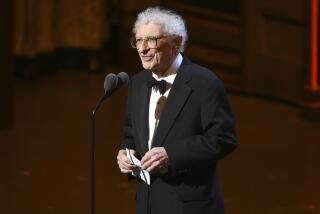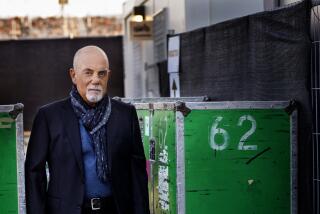Putting a Finger on the Trouble With Harry : His Fans Think He’s Great, but Some Critics Aren’t So Sure
- Share via
Harry Connick Jr. is making a lot of people upset. He’s upsetting a lot of jazz fans for turning his back on the musical developments of the last 40 years and championing the early piano styles of Earl (Fatha) Hines, Fats Waller, Art Tatum and Duke Ellington.
Connick, who pleaded his musical case last week at the Coach House in San Juan Capistrano, also is upsetting a lot of jazz critics for putting more energy into his increasingly Hollywood-ized stage act than into his piano playing or singing.
And all this brouhaha is upsetting his rapidly growing following, which is angry with those close-minded critics and snooty aficionados for suggesting that this would-be Emperor of Jazz has nothing going for him except those stylish new clothes.
Of course, there is far more to the canonization of Connick than his musical talent. The fact is that he wouldn’t have one-tenth of the copy flowing out of writers’ pens if he wasn’t so young (21), so Southern-gentlemanly affable and so gosh-darn handsome. James Booker was a great piano player too, but a one-eyed black one with an odd walk and a foul mouth. You hardly heard anything about him.
I had gotten a little touch of Harry on his home turf at the New Orleans Jazz & Heritage Festival last year, but the Coach House show was the first full performance I had seen. I wanted to like him a lot, because I agree with what Connick told the audience Tuesday night: that once upon a time, jazz was both great music and great fun.
Much criticism of Connick centers on his outgoing personality and will to entertain--two things that have seemed anathema to jazz in the post-War era, as the notion that jazz is indeed An Art Form has gone to the musicians’ heads.
Experimentalists from Charlie Parker and Thelonious Monk to Ornette Coleman and Charles Mingus developed a new vocabulary. But they also turned jazz into something more for musicians themselves than for audiences.
Stereotypically, post-bop jazz must be musically complex, intellectually demanding and personally remote. It’s as though musicians would taint The Form by so much as acknowledging the audience.
It’s kind of like the Middle Ages, when a select circle of monks guarded all knowledge, reserving wisdom to themselves lest the lowly masses soil it with their grubby fingers. It’s an attitude that irritated me through college, when I played in jazz big bands and often ran into other musicians who looked down their noses at anything as populist and accessible as rock ‘n’ roll.
While instrumental proficiency has grown exponentially, the modern jazz musician, as well as many critics, seems to prize technique over all else. Last year one of this paper’s critics panned classical clarinetist Richard Stoltzman when he fronted the Woody Herman band at the Orange County Performing Arts Center.
The complaint was that Stoltzman, whose reputation was built on his Beethoven and Mozart and not on his Benny and Woody, didn’t have the chops of any number of competent jazz reed men. True enough. But for my money, his fluid and melodic soloing had far more heart.
So, for a variety of reasons, it was encouraging to hear Connick talk about his love for an earlier generation of musicians who played music that could appeal to the listener emotionally as well as intellectually.
The reviews?
“Columbia Records is doing for Harry Connick Jr. what it did for Wynton Marsalis in 1982. The difference between the two, however, is that Marsalis had the talent to warrant the hype; Connick, as indicated during his hourlong opening set, does not,” wrote Times critic A. James Liska about Connick’s performance at Catalina Bar & Grill in L.A. earlier this month.
Daily News music critic Richard S. Ginell wrote that in a 1987 performance at the Roxy, Connick left the impression “of a fumbling, heavy-handed pianist who couldn’t swing to save his life. Now,” Ginell wrote, “it is astonishing to see that Connick has become some kind of media idol . . . pursued by Hollywood, accompanied by hurrahs from reviewers and other media nabobs who perhaps don’t know any better.” The Connick who returned to Southern California this month, Ginell said, “was pretty much the same performer we saw at the Roxy--only slicker and more personable.”
Connick addressed the critical fusillade at the Coach House on Tuesday, saying he would rather win over 500 regular people than 5 critics. The audience ate it up.
Truth be told, those reviewers did go too far. His runs and flourishes weren’t always metronomically precise, and he never approached the wizardry of Tatum or the other greats he idolizes. But he played energetically, with a particularly strong left hand, and at times engaged in stimulating exchanges with bassist Ben Wolfe that represented the best of symbiosis. Other times, though, he restricted his keyboard efforts to pointless noodling, and his singing was rarely more than pleasantly forgettable.
The biggest question raised by his performance, though, is why he seems interested in being a devil-may-care raconteur who shows everyone a great time rather than a musician who touches everyone with great music. Connick’s real problem isn’t the critical barbs; it’s that in rebelling against the somberness of most jazz, he has swung too far the other way.
By succumbing to the accolades at such an early point in his career, Connick may be giving short shrift to what could be a big talent. Remember what happened when Elvis decided to be a superstar instead of just a great rock ‘n’ roll singer? Connick isn’t the Elvis of jazz, though some of the hype might lead you to think so.
Saving graces are that he is young enough to grow out of his adolescent reaction to stardom, and that he does have a great sense of history, evident in a repertoire that includes standards such as “Let’s Call the Whole Thing Off,” “The Sunny Side of the Street” and “Please Don’t Talk About Me When I’m Gone.”
At least Connick is on the right track. A shot in the arm, or perhaps a kick in the pants, is just what jazz needs to get it off its smug keister.
But in his zeal to get audiences humming “I’m Just Wild About Harry,” Connick shouldn’t forget that when it comes to his music, it’s gotta be “All or Nothing at All.”
More to Read
The biggest entertainment stories
Get our big stories about Hollywood, film, television, music, arts, culture and more right in your inbox as soon as they publish.
You may occasionally receive promotional content from the Los Angeles Times.









